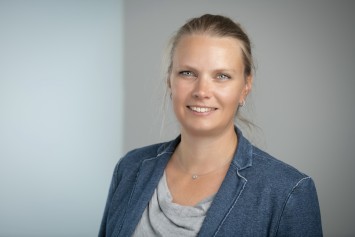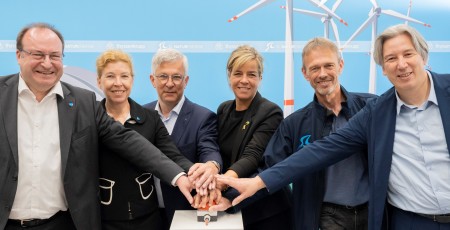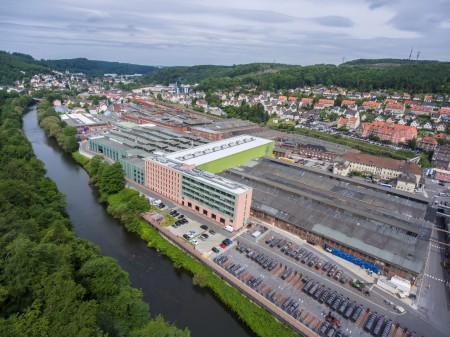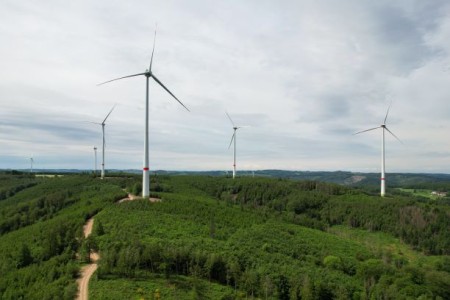Daily press, 2024-06-03, 02:10 pm
Green wind power for steel production: Pioneering project by thyssenkrupp Steel and SL NaturEnergie supplies Hagen steel location with renewable energy from nearby wind farm
Hohenlimburg, June 3, 2024 – thyssenkrupp Hohenlimburg, a subsidiary of thyssenkrupp Steel, is the first German industrial plant to receive locally generated wind power through a direct connection. With the green energy from the four new wind turbines installed by project partner SL NaturEnergie, the company can now cover 40 percent of its average annual electricity requirements. Today, the Hagen plant was officially connected to the wind farm in the presence of Mona Neubaur, the State Minister for Economic Affairs, Industry, Climate Action and Energy. Minister Neubaur: "The inauguration of the wind farm is an important step on the path of transformation toward a climate-friendly industry and future. For the first time, an industrial plant will be supplied directly with locally generated green wind power. I'm sure that this pioneering project will have a strong impact and set a good example for other industrial companies. All sectors will have to pull together jointly for a sustainable transformation. This will require investment from companies and cooperation with other partners. This is how the transformation in North Rhine-Westphalia will work!
Hohenlimburg project is part of the decarbonization strategy at thyssenkrupp Steel
As an intensive user of energy and emitter of CO2, thyssenkrupp is a company that is determined to make its production comprehensively climate-friendly in the future. The first direct reduction plant being constructed at the Duisburg site is at the core of these initiatives, and once operational, it will have the capability to prevent up to 3.5 million metric tons of CO2 from being emitted. The aim is also to decarbonize the supply and processing stages. The green electricity project at thyssenkrupp Hohenlimburg is a role model: it has the potential to save 11 percent of the steel location's CO2 emissions as a first step, and there is scope for further expansion. Dr. Heike Denecke-Arnold, Chief Operations Officer at thyssenkrupp Steel: "The project at our location in Hohenlimburg forms an important part of our decarbonization efforts, and is a great example of successful local cooperation. The significance of steel in the turnaround in energy and climate policy is exemplified by wind energy in particular: after all, without the special product of electrical steel, no wind turbine can turn and electricity will not be able to be transported from where it is generated to where it is used. As one of the world's leading suppliers of electrical steel, we are thus contributing to a sustainable future in many respects: with our products themselves, and now also with their CO2-reduced manufacture."
Pilot project with a signal effect for wind power operators and industrial companies
In 2023, wind energy accounted for the lion's share of electricity generated from renewable sources in Germany, at 28 percent, surpassing the combined electricity output of all lignite and hard coal-fired power plants for the first time. Onshore, the necessary expansion of renewables often takes the form of local cooperation. The Hohenlimburg project is a role model here, because it is the first direct connection of a wind farm to an industrial plant.
The four wind turbines, each up to 160 meters in height and with a rotor diameter of 138 meters, are connected to the thyssenkrupp Hohenlimburg plant network via a direct line a good 3 kilometers in length. The wind farm generates over 55 million kilowatt hours annually, allowing the majority of this energy to be used directly without relying on the public grid. Surplus quantities are only supplied to other Group sites via the public grid in the event of high wind speeds or lower demand at the plant. "The Hohenlimburg project is absolutely a pilot project in its nature. The most efficient way to bring new energy and industry together is through direct delivery from a wind farm to an industrial facility. At the same time, this reduces the strain on public electricity grids. We want this to become the standard in Germany. Unfortunately, the current energy legislation still contains numerous hurdles, so politicians will need to step in again to help achieve this," emphasizes Klaus Schulze Langenhorst, founder and Managing Director of SL NaturEnergie, adding: "It is essential that we make every effort to preserve value creation and employment opportunities within the country. First and foremost is a secure energy supply. A sufficient supply of wind power is essential in order to provide industry in North Rhine-Westphalia with a sustainable and affordable supply of clean electricity."
thyssenkrupp Hohenlimburg – a medium-sized steel location with a long tradition
thyssenkrupp Hohenlimburg employs around 1,000 people to produce a high-quality specialty product: hot-rolled precision steel strip from Hohenlimburg. Customers are primarily the cold rolling industry, the automotive industry and its suppliers, as well as the sawmill and agricultural machinery industries. The central production unit is the precision strip mill, which is a hot-strip mill capable of processing steel slabs with particularly narrow dimensions. It accounts for a considerable proportion of the plant's electricity requirements, which amount to 110 gigawatt hours per year – around 80 percent of the electricity requirements of the neighboring town of Iserlohn. The switch to green electricity generated by wind turbines represents a real milestone for the long-established company: "We can meet 40 percent of our electricity needs with the green electricity generated by the first four wind turbines on an annual basis," explains André Matusczyk, Managing Director of thyssenkrupp Hohenlimburg GmbH, adding: "This will save us a considerable amount of grid fees and, thanks to the direct connection, relieve the burden on the public electricity grid. With this cooperation project, we are breaking new ground in order to make our location sustainable in the long term. Locally produced wind energy offers a reliable and expandable basis for this. Another important aspect: We are thus reducing our own carbon footprint and reducing the carbon intensity of our products – a clear benefit for our customers and a clear commitment on our part: we are taking the turnaround in climate policy seriously."







